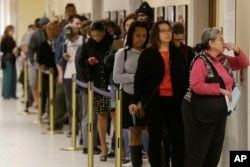California's fast-changing demographics are reflected in the state's top two candidates for the U.S. Senate. Analysts say the two women, who are members of ethnic minorities, highlight the Republican Party’s challenge of competing in a state where immigration has reshaped the political map.
For the first time, a Republican candidate will not appear on the ballot in a California statewide race. Voters have selected two Democrats to compete for the seat of retiring U.S. Senator Barbara Boxer: California Attorney General Kamala Harris, an African-American, and U.S. Representative Loretta Sanchez, who is Hispanic.
Harris led a crowded field of 34 candidates in the June 7 primary election, where she received 40 percent of the vote, more than double what Sanchez drew. The top Republican, Duf Sundheim, a former state party chairman, received just 8 percent and failed to gain a place on the general election ballot.
This has happened before only in congressional and state legislative races, said former Republican strategist Dan Schnur, who is now an analyst at the University of Southern California. He said voters approved the top-two qualifying system in 2010 with the goal of favoring more centrist candidates.
"This is the first time," Schnur said, “we've seen it at the statewide level [where] the Republicans are simply not in a position to compete.”
Minorities as majority
The unprecedented contest is partly the result of shifting demographics. Hispanics, Asian-Americans and African-Americans together make up more than half of California's 39 million residents. The state's 15 million Hispanics became the largest ethnic group in 2014, edging out non-Hispanic whites. California's Hispanics and African-Americans overwhelmingly vote Democratic, and the state's Asian-Americans have been moving in that direction for two decades.
Democrats have an advantage in party registration, with 45 percent of California voters registered as Democrats versus 27 percent as Republicans.
Have Republicans failed to keep up?
"The simple answer is absolutely," said Greg Nordbak, the former mayor of the California city of Whittier. Political offices in California cities are nonpartisan, but Nordbak, a Republican, said, “The Democrats as a party do a much better job of telling their story.”
He believes that Hispanics — who make up nearly 40 percent of the population, and a smaller but growing part of the active electorate — are a natural fit with his party because they are “hardworking, proud and [have] a strong sense of family values.”
Inclusion recommended
Is California's system unfair in placing the top vote-getters in the primary election on the final ballot?
No, said Republican Barbara Stone of the Los Angeles County Lincoln Clubs, a Republican organization. "It's not the primary system. It's the party, which needs to be much more inclusive."
California Hispanics began abandoning the Republican Party in 1994, when then-Governor Pete Wilson, a Republican, endorsed a voter-sponsored initiative called Proposition 187. The measure, which restricted public services for illegal immigrants, passed but was overturned in court. Hispanics widely saw it as anti-immigrant.
This year, Hispanics have been registering new voters in response to statements by presumptive Republican presidential nominee Donald Trump, who has said that Mexico is sending some rapists and drug dealers to the United States. He has promised to build a wall along the southern U.S. border, which also angered many Hispanics.
While Trump points to some Hispanic supporters, his candidacy is ensuring a "massive flight of moderate and liberal-leaning independents from the GOP [Republican Party] to support Democratic candidates," said Earl Ofari Hutchinson, an African-American commentator.
In heavily Republican rural regions and inland cities in California, candidates often talk about illegal immigration, said political scientist Fernando Guerra of Loyola Marymount University in Los Angeles. He said the talk appeals to some Republicans "even though it's not good for the Republican Party statewide."
Odds on Harris
Harris is favored to win the November election to replace Boxer, a Democrat who has held her Senate seat since 1993. Harris is better known in northern California, where she was a prosecutor, and Sanchez in the southern part of the state, where she represents a district in Orange County that was once a stronghold of Republican incumbents. Sanchez holds centrist positions on the economy and national security, and is more friendly toward business, said analyst Schnur.
"Harris is much more a classic progressive Democrat," he said.
Political scientist Guerra said Sanchez could win some Republican support, but must be careful that her appeals do not alienate progressive Democrats. She should do well among Latinos, but faces an uphill battle against her rival, he said.
Colleague for Feinstein
Whoever wins in November, a woman of color — and a Democrat — will hold a major statewide office as one of two U.S. senators from California. The other is Dianne Feinstein, also a Democrat.
Commentator Hutchinson sees the Senate race as "simply a side note to the demise of the GOP as a major force in California politics."
Republicans say their party's message should have broad appeal. Their state platform speaks of free markets, family values, opportunity based on merit, and protection of individual liberties.
California Republicans have “the values to turn this country around,” said Nordbak, but he added that until they express their message more effectively, “there are fewer and fewer of us every year and we are losing a pure numbers game.”



